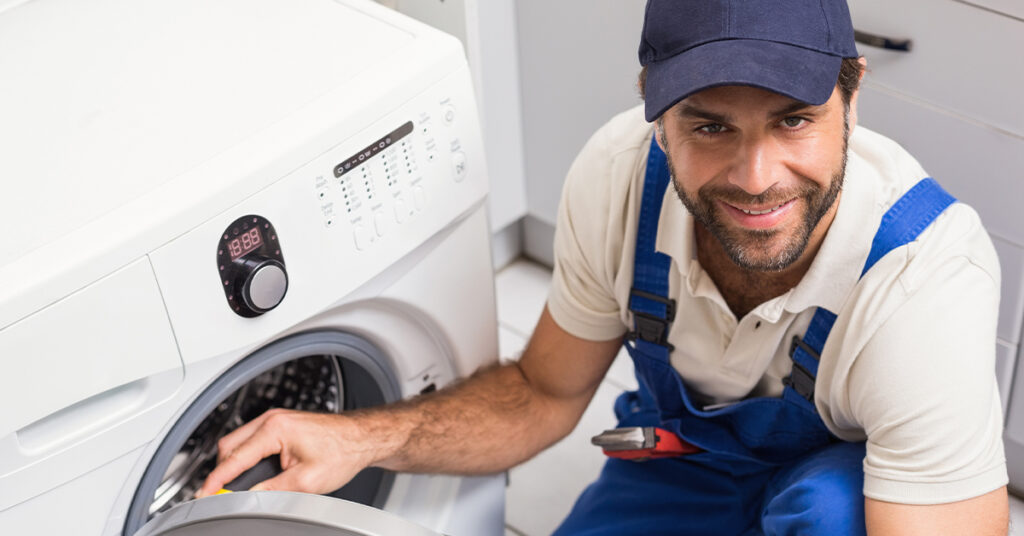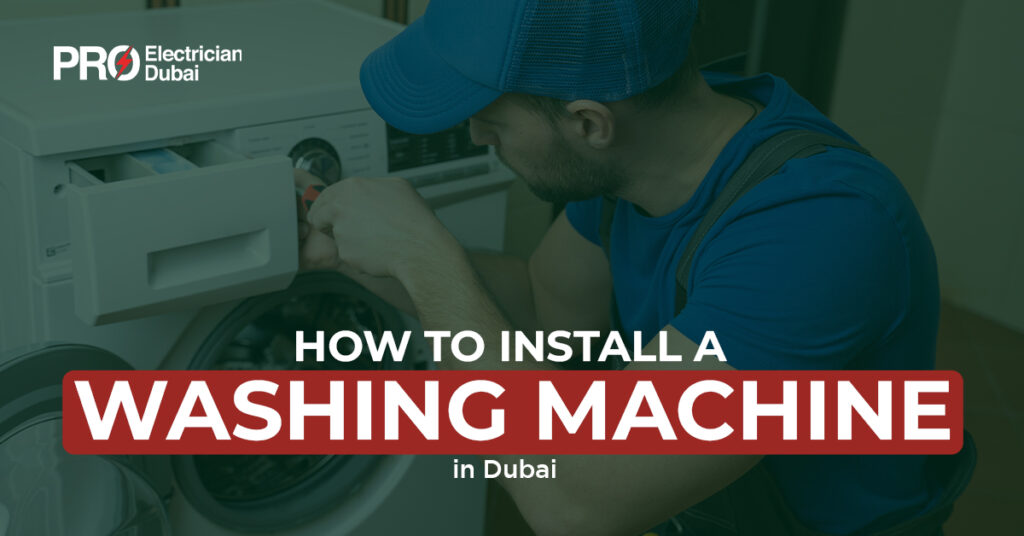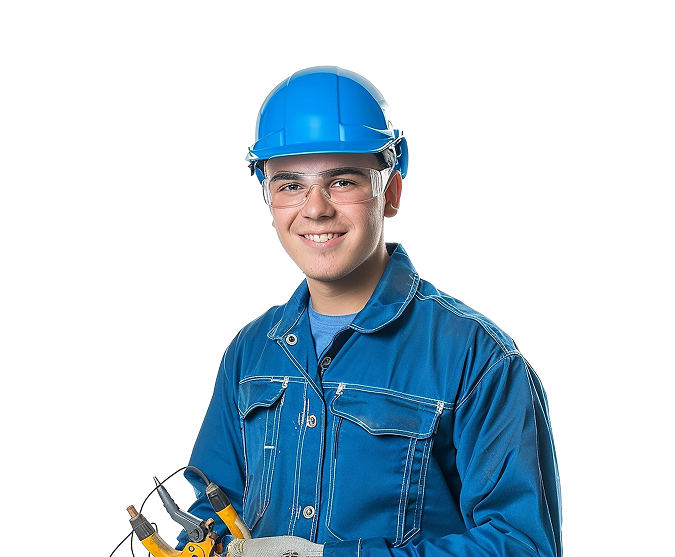Installing a washing machine in Dubai might seem straightforward, but it involves more than just plugging it in. You need the correct plumbing, a stable electrical connection, and proper leveling to avoid leaks, electrical faults, and premature wear. As a licensed Dubai electrician and appliance installer with over 20 years of hands-on experience, I’ve seen countless cases where poor setup led to costly repairs.
Whether you’re moving into a new apartment in Downtown Dubai, upgrading your home in Jumeirah, or setting up a laundry space in a villa, this guide will walk you through how to install a washing machine safely and efficiently, and explain when it’s smarter to hire a professional washing machine installation service in Dubai.
Step-by-Step Washing Machine Installation Guide in Dubai
1. Choosing the Best Location
Before you start, select a spot that meets Dubai’s building and electrical requirements.
- Water supply access: There should be a cold-water inlet with a compatible tap connection.
- Drainage outlet: Ideally a floor drain or wall drain nearby.
- Electrical socket: A grounded 3-pin socket (220-240V) that meets Dubai Municipality safety standards.
- Space and ventilation: Leave at least 2–3 cm around the machine for airflow.
- Flat surface: To avoid vibration and movement during spin cycles.
Tip: In Dubai apartments, the best place is often the kitchen cabinet area with integrated plumbing. In villas, laundry rooms or utility spaces are ideal.
2. Preparation Before Installation
- Clear the area: Remove any obstacles and ensure you have easy access to the connections.
- Turn off water supply: Prevent accidental leaks.
- Check water pressure: Dubai homes usually have high water pressure, ensure it’s within your machine’s recommended range (typically 0.5–8 bar).
- Unbox carefully: Keep all manuals and accessories.
- Remove transit bolts: These secure the drum during transport and must be removed before use. Replace with the provided plastic caps.
3. Connecting the Water Inlet Hose
- Attach the cold water inlet hose to the back of the washing machine.
- Connect the other end to the water tap connection, tightening by hand.
- If needed, use a washing machine tap connector for a secure fit.
- Avoid over-tightening, which can damage threads.
In Dubai’s hard water conditions, consider installing an inline filter to prevent limescale buildup.
4. Setting Up the Drain Hose
- Connect the drain hose to the wastewater outlet.
- Ensure it’s positioned between 60–100 cm from the floor to avoid siphoning.
- Use a jubilee clip or clamp for a secure connection.
- In apartments, connect directly to the under-sink waste trap if no floor drain is available.
5. Electrical Connection
- Plug the washing machine into a grounded socket.
- Avoid extension cords, they can overheat under heavy load.
- Check that your home’s electrical circuit can handle the appliance load (usually 10–16 amps).
- In older Dubai buildings, you may need a dedicated socket installed.
6. Leveling the Machine
- Use a spirit level to check balance.
- Adjust the feet until the machine sits perfectly level.
- This prevents excessive vibration, noise, and premature bearing wear.
7. Testing the Installation
- Turn on the water supply and check for leaks.
- Run a short cycle without laundry to test filling, draining, and spinning.
- Listen for unusual noises and recheck hose connections.
Front Load vs. Top Load Washing Machine Installation in Dubai
- Front Load: Requires precise leveling, often installed in kitchen cabinetry or laundry alcoves. Great for apartments where space is limited.
- Top Load: Easier to load and often preferred in villas with larger laundry rooms. Requires more vertical clearance.
Common Challenges in Washing Machine Setup Dubai
- Limited drainage access in high-rise apartments
- Incorrect water tap thread sizes
- Old plumbing with corrosion or scale buildup
- Balcony installations requiring weatherproofing
- Electrical outlets too far from the installation point
When to Hire a Professional Washing Machine Installer in Dubai

While you can install a washing machine yourself, there are times when professional help is worth every dirham:
- You don’t have the right plumbing or electrical setup
- The space needs custom carpentry or cabinet adjustments
- You’re installing a built-in or stacked washer-dryer
- You want to maintain your manufacturer’s warranty
- You’re not confident in handling water and electricity connections together
Professional installation ensures your appliance is connected according to Dubai safety codes, reducing the risk of leaks, short circuits, and voided warranties.
You can also check our washing machine installation service Dubai for same-day expert setup.
Plumbing and Electrical Requirements in Dubai
- Plumbing: Standard ¾ inch threaded tap connection; proper drainage outlet within 1.5 m.
- Electrical: 220–240V grounded socket, circuit breaker compliance with Dubai Electricity and Water Authority (DEWA) guidelines.
- Ventilation: If installing in enclosed cabinetry, ensure ventilation grilles are present to avoid overheating.
DIY Tools for Installing a Washing Machine
- Adjustable wrench
- Spirit level
- Screwdriver
- Jubilee clips or hose clamps
- Bucket or towel (for any water spills)
- Pliers for tightening hose connectors
Safety Tips for Washing Machine Connection in Dubai
- Always disconnect the power before working on the appliance.
- Avoid placing the washing machine where it’s exposed to direct sunlight or rain (especially for balcony setups).
- Do not route the drain hose more than 1.5 meters; it can affect drainage.
- If unsure about any connection, consult a licensed Dubai technician.
Conclusion
Installing a washing machine correctly is critical for safety, efficiency, and longevity. In Dubai’s unique building layouts and climate, a proper setup means fewer breakdowns and better performance. Whether you’re connecting a brand-new front loader in a high-rise apartment or setting up a top loader in your villa laundry room, following the right process or hiring a skilled installer will save you time and stress.
If you want it done right the first time, Pro Electrician Dubai offers same-day installation services across Dubai, ensuring your appliance is installed securely, leveled perfectly, and ready for years of trouble-free use.
Call us today for expert appliance installation in Dubai.
FAQs
How do I install a washing machine in Dubai?
Follow the steps above: choose a location, connect the water inlet and drain, plug into a grounded socket, level the unit, and run a test cycle.
Do I need a plumber to install my washing machine?
If you already have proper connections, you can DIY. If plumbing needs modification, hire a professional.
How much does it cost to install a washing machine in Dubai?
Prices range from AED 150 to AED 350 depending on complexity and location.
Can I install a washing machine without a technician?
Yes, if you have basic tools and all connections ready. However, professional installation ensures compliance with safety standards.
What plumbing is needed for a washing machine in Dubai?
A cold water inlet tap, proper drainage outlet, and sometimes an inline filter for hard water.
Where should I place my washing machine in a Dubai apartment?
Common locations include kitchen cabinets or designated laundry spaces with water and drainage points.
Who installs washing machines in Dubai?
Licensed appliance installers, plumbers, and electricians, such as Pro Electrician Dubai.
How long does washing machine installation take?
A straightforward setup takes 30–60 minutes. Complex installations can take 2–3 hours.
Can I install a washing machine on a balcony in Dubai?
Yes, but you must ensure waterproofing, shading from sunlight, and safe electrical connection.
Do I need permission to install appliances in Dubai rentals?
In most cases, yes, check your tenancy contract and get approval from your landlord.


